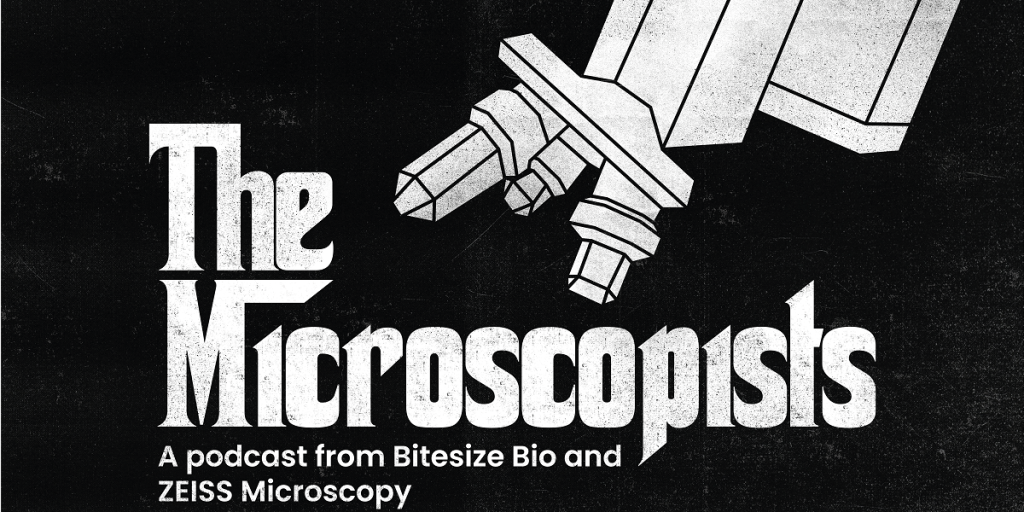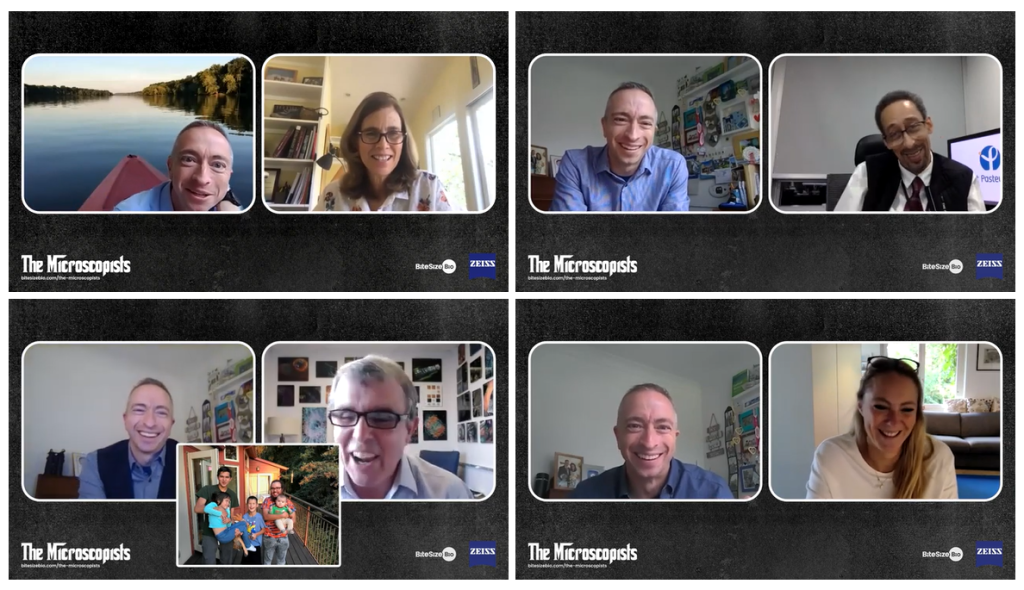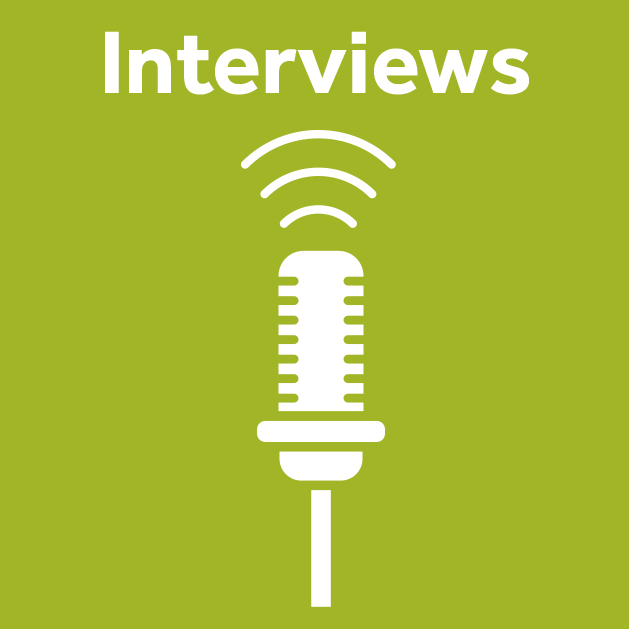An interview with Peter O’Toole – part 1 (The Microscopists)
Posted by FocalPlane, on 23 November 2021

Have you listened to The Microscopists podcast, hosted by Peter O’Toole, yet? If you haven’t, you are missing out on some really interesting and engaging interviews with researchers making great contributions to the field of microscopy. The podcast was launched in July 2020 and the number of listeners and subscribers has just kept increasing. We decided to interview Peter to learn more about this successful podcast and a little bit about the person behind The Microscopists, too.
Peter O’Toole obtained his PhD in the Cell Biophysics Laboratory at the University of Essex, UK. After a four-year postdoc at the same university, he joined the Department of Biology at the University of York to establish the Imaging and Cytometry Laboratory, and then became Director of the larger Bioscience Technology Facility five year ago. Aside from running the facility, Peter also holds important positions in different organisations such as the Royal Microscopical Society, Core Technologies for Life Sciences and the European Light Microscopy Initiative (ELMI). We divided this interview into two parts – the first, which you can find below, is to learn more about The Microscopists podcast, and the second will be to talk about Peter’s work running an imaging facility.
How did you come up with the idea of creating The Microscopists podcast?
There are two parts to what inspired the idea of The Microscopist. The key factor is that I hate introducing key speakers at conferences. At the Microscience Microscopy Congress (MMC) in 2018, Lucy Collinson was one of the plenary speakers and her details and CV-type information were in the program. So, I thought I’d introduce Lucy on a more personal note, talking about bits that people wouldn’t know about her (after checking with her first!). Then I was hosting ELMI and I had to introduce Scott Fraser, Ernst Stelzer, Jacob Hoogenboom, and a few others and I thought I would do the same. It was easy to just sit down with them for a few minutes and find out a bit about them personally. I asked them questions like, “What are your hobbies?” and “What do you like doing?” They were really forthcoming with very entertaining information. I think showing that they had outside interests made them seem much more approachable. That was great because we had loads of PhDs and postdocs in the audience. I thought it was a really important message for people to hear, because I think there are scientists out there that do work 13 hours a day and only live, eat and breathe their work (that’s their hobby, as well), but you can still be a superstar in your field and balance it with a personal life outside of work.
For the idea of the podcast, I thought it would be really great to just get people talking about themselves so others can meet the scientists that we read and hear about from their research but get to know them on a more personal level.
That’s what inspired the idea, but I had to find a way to do it. I’m not very good at recording. I can take microscopy images but recording and editing for YouTube/Spotify/iTunes etc – that’s not me. I needed someone professional, so I looked for sponsorship/support. I contacted Zeiss because we’ve got connections with them through the imaging facility, and they were very keen and immediately understood the vision. They then engaged Bitesize Bio to help us with the recording and editing of the podcasts. I thought we had to put the interviews on YouTube – I’m a very physical person and I think it’s important to see people – but Bitesize Bio recommended just audio. So we did both! Both Zeiss and BiteSize Bio have been great in supporting these.
For people who don’t know the podcast, how can they find it, and which format is the most popular?
It’s on the Bitesize Bio page – this is where we get most of the views and downloads – and on iTunes, Stitcher, Google, Spotify, YouTube and RSS.
Audio podcasts are a lot more popular than video. The audio gets between 7-15 times more hits than the video. But the video is still worth doing, because I ask the guests to send in photos. Scott Fraser was one of the first people I invited, and I wanted pictures of his car (he has a Tesla) and his amplifier. I thought it would be good for people to physically see those passions, and I was interested, too! It really helps capture them as a person.
How do you prepare for the interviews?
When you are at a conference, you sit down with someone, and you just talk. That’s exactly what the podcasts are meant to be. I will very briefly have a look at online biography. But literally, it will be no more than four or five lines of information and we just take it from there. So, it’s very free format. It’s important to have a few questions in your pocket, though, to make sure you don’t get an awkward silence, or spend too long on any one point. I really like asking what they found most difficult in their career. I think it’s really important for other people to hear that it’s not straightforward. Everyone has difficult times.
The quickfire questions are often most fund and revealing! For example, what type of food they like to eat, what type of drink, what TV shows they watch. I really like it when they reveal that they actually watch a trashy show – they are just normal people, and I wanted to make the podcast a bit more light-hearted.
As I mentioned before, the guests send me some pictures, which is great. The pictures are so revealing because suddenly you don’t have to have a script. You can just use the pictures as a good prop to talk about. More importantly, it also helps those watching get a true feel for what they are like outside of work.
Does the guest know the questions in advance?
No, a few have asked me for the questions in advance and I give them some brief examples of some of the common questions. For example, that I’ll probably ask: what your favourite publication is, and why you got into science.
I think we made a mistake on one. I met with the guest before the interview because they wanted to go through it, almost like a practice. It was brilliant. Then when we came to do the recording a few days later, it wasn’t so spontaneous and maybe lost an edge. Laughter wasn’t the same, because we already knew the answers. It’s not the ‘Gosh, yeah, forgot about that’ or the ‘Ah, yeah, remember this’. There was none of that spontaneity in it.
This is definitely not like other science podcasts, isn’t it?
You can listen to a podcast on people talking about their science, but they are often quite serious, aren’t they? You aren’t sitting around just listening to it, you’re kind of studying at the same time, and I really wanted to make something that you could just listen to or watch at home, or on your coffee or lunch break. It doesn’t matter if you missed the last question and answer. I think that’s what differentiates what we’ve done from many other podcasts, which are really about the scientist and their work. My podcast covers a little bit of that, but it’s not the main focus of the interview. If you have an early PhD student, or even undergraduates, too much heavy science will lose them. And it’s really about trying to help inspire them. So I talk about the great work the guest has done, but then I move on from that and talk about other things. So far, all my guests seem really quite comfortable with it!
Maybe it’s a little unfair to ask you which interview you enjoyed the most, but were there any particularly surprising stories or anecdotes in any of your interviews that you weren’t expecting?
Loads of them, although there’s something in every interview. Ernst Stelzer becoming a physicist because he wanted to build a time machine. Jennifer Lippincott-Schwartz kayaking to work. I didn’t realize Jennifer Waters did so much sewing. Eric Betzig revealing he still needs a salary. He still wants to be an astronaut, but ultimately, he’s tied into following what he’s good at (I am not saying he would not be a good astronaut!). If he could do anything in the world, I bet he wouldn’t be doing what he’s doing today. Even a Nobel laureate can’t just switch jobs. You suddenly realize these people are driven, but they have a sense of obligation as well. That’s interesting.
When I interviewed Chris Linttot, co-founder of Zooniverse, I had no idea he was a TV presenter for Sky at Night as well. I know I’ve probably seen him on it and just not made the connection. And Spencer Shorte, who I know really well, talked about a car crash that he was in, which he rarely mentions. That was a really personal, heartfelt moment.

Did you find something that all guests have in common?
I think the podcasts show that they are super normal people who are super clever, and I think in all cases, they had a degree of luck. They find themselves in the right place at the right time, but they’ve had to go out and catch the wave. There are people who wait for the wave to come to them, but I think you have to swim out, keep searching for the right wave and then surf it. I think all the guests who succeeded have also made it happen; they’ve created their own luck to a degree.
Who else do you want to interview?
There’s quite a few (laughs). I’ve got a very, very long list of people. It’s nice to have some scientists that are well established and others that are establishing, but certainly on a very rapid trajectory. I also consider different imaging fields, from electron microscopy to light microscopy to image analysis to end users. We have 29 interviews so far; we should have 36 in total. After those 36, I would love to get up to 50 because there are some great names.
I’d love to get Paul Nurse or Jeremy Farrar, for example. I’d really like to get my PhD supervisor who was right at the forefront of single molecule imaging back in the 90s, Richard Cherry. He’s been retired now for some years. The generation of 30–40-year-olds that mostly engage with this type of media, they’re not going to know who he is and so might not listen to such an episode. I think that’s a real shame. I’d like to encourage people to tune in to episodes featuring people that they haven’t heard of because I think there’s a lot to learn and feel inspired by when you listen to those individuals.
What if you could travel in time? Who would you like to interview?
I would do a double header with Ernst Abbe and Carl Zeiss because these are two very different characters. I’d love to see if they really got on or not, what their views were, how similar or not they were. When you look at the pictures, they’re just to two bearded men. It would be nice to really get to know the personalities behind the drives.
This has become a very popular podcast – there are hundreds and thousands of views on the different platforms – were you expecting this?
I had no idea what a good number would be. Podcasts across all platforms are not that easy to set up. What’s good value for the effort? – I had no idea. When we got to 1000 views for one of the podcasts, I thought ‘you don’t get 1000 people in a plenary room’. Then we got 7000-8000 views for another podcast, and I thought, ‘well, that’s bigger than some of the biggest conferences’. There’s nowhere else that that person will get heard by that many people, and suddenly you realize that this is also helping them with their outreach. You have an obligation to spread the word and to reach wider communities. So absolutely, it’s doing far better than I thought it would be.
I think we can finish with some of the questions you usually ask your guests. Favourite microscopy publication of yours?
I think the ptychography paper in Scientific Reports 2013. Because that was a real punt. We developed the idea, the application, and a Master’s project student did a lot of the work. That was a real in-lab start-end job. I think that’s what I’m most proud of.
Otherwise, it’s got to be my first publication in BBA on spectrin biochemistry and its liquid interactions. I always remember posting the manuscript through the letterbox, which is what we had to do then (laughs).
Best science joke?
I pun a lot. I would say I don’t have a favourite joke – I just have favourite topics. So if you’re going to do microscopy, you’ve got to always remain focused and keep up, and make sure you don’t lose the objective that you started with. And make sure you’ve got the right field of view when you’re answering questions. It’s the puns that I like.
Last one – where do you find inspiration?
I don’t think I’ve told anyone before. One of my biggest motivations is always to make my mom proud. I’m always thinking, ‘would Mom be proud of me if I did that?’. She’s a very big motivator, actually.


 (1 votes, average: 1.00 out of 1)
(1 votes, average: 1.00 out of 1)